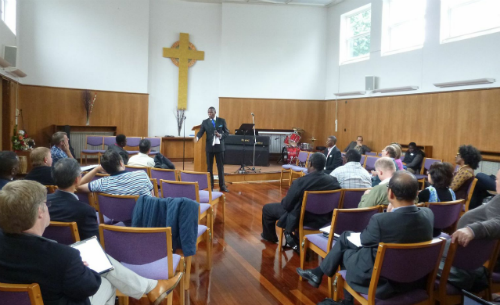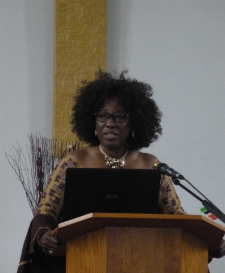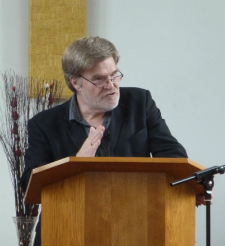"God wants a covenant in Christian partnerships... rather than just a bit of collaboration"
Almost 50 Christians from across the UK and various cultural backgrounds met together on Saturday 6 September at Spurgeon’s College in London to explore how missionaries and pastors from the majority world can work in partnership with indigenous British Christians in the UK

With increasing numbers of Christians from the global south moving to the UK as missionaries, the
Centre for Missionaries from the Majority World organised this Partnership in Mission conference to provide a space for honest discussion about how Christians of all backgrounds can work together more effectively and in equal partnership.
Celia Apeagyei-Collins, vice president of Tearfund and founder of the
Rehoboth Foundation, spoke of how the Holy Spirit is working in the lives of many ethnic minority Christians in the UK, prompting them to have a heart for this land and helping them understand the terrain here. 'God is savvy, he sees the future and has moved people from the global South in His wisdom to the UK to position us for what he is going to do,' Celia explained.
Yemi Adedeji, director of the Evangelical Alliance
One People Commission, agreed that while ethnic minority churches often did not initially focus on reaching out to British people, many now want to embrace their new community and are actively looking for ways to reach out to those around them.
Harvey Kwiyani, a director of CMMW, shared how many African pastors have told him they want to reach British people and be missional, and they are asking for training to engage effectively. CMMW in partnership with others is therefore working on a project in Birmingham called Missio Africanus, creating spaces for conversations and training pastors in cross cultural mission within the UK. Missio Africanus will also become a flagship journal for African missions and theology in Britain.
'It’s about time we stopped focusing on what is different and zeroed in on the mission'
With six in ten of the missionaries to Ghana in the 19th century having died within two years, Celia shared her sincere thanks for the sacrifice of the missionaries who went from the UK across the world to share the good news, and for the prayer and worship of Christians across the decades in the UK, saying: 'We need to celebrate and honour those that have gone ahead of us.'
Stories were shared at various points of the conference which revealed the divisions still evident among Christians – with one person asking why they were introduced as “my little African friend” when speaking at churches. Others shared how ‘white flight’ is a reality in many churches, with white people leaving once the church becomes largely black or a black leader begins, and pastors saying that many in their congregations do not want to coexist with people of other races.

'It’s about time we stopped focusing on what is different and zeroed in on the mission,' Celia said, encouraging Christians to unite behind a shared vision to see God’s kingdom come. Partnership requires exchanging ideas and experiences with others, and letting truth bind us rather than being divided on doctrinal issues such as the prosperity gospel.
Celia spoke passionately about the need for us all to become more culturally intelligent – understanding where each other is coming from rather than viewing each other as “strange”. For example, we can understand why African Christians often pray through the night in prayer vigils when we appreciate that they have often come from cultures where you have suffered and need to rely on God for your basic needs, and where you are trained from a young age to pray for hours on your feet.
African Christians can also find it hard to understand why some British Christians are relaxed and informal in the way they pray to God, but Celia has realised that this is because in the British culture people often relate to their fathers in a friendly way, rather than having a respectful and fearful relationship.
'We can only have partnership when we accept that the other person has something to offer,' Celia said, acknowledging the reality that often we look down on others and don’t consider them as equal partners.
Drawing on the concept of covenant at Hebron in
1 Chronicles 12, she spoke of how God is looking for a covenant in Christian partnerships rather than just a bit of collaboration or participation. And covenant is not possible without relationships, which she suggested are formed through spending time and eating together, forging a tight unit and coming to the place where you ask others what their needs are and offer to supply them, getting alongside people and weeping with those who weep.
God is looking for a covenant in Christian partnerships rather than just a bit of collaboration or participation
Yemi agreed with Celia that partnership is not possible without relationship. Using 1 Corinthians 14:22 he expounded on how we all have something to offer, with God placing in each of us the things he wished, and the body not being able to function without each doing its part.
When partnering with others he emphasised the importance of knowing who you are and how you can serve the other person or organisation. For example your church may not have a building, but you may be passionate in prayer and can partner with another church’s project and pray for that. Or you may not have many people to run projects, but have a building you can offer other churches to use.

Roger Standing, principal of
Spurgeon’s College, gave the final talk. He spoke passionately about the vision of a New Jerusalem where worshippers of all ethnicities worship before the throne, rich in diversity but uniting as one functioning community. He considers multi-ethnic churches as the best reflection of this vision, though acknowledges there are multifaceted reasons why mono-ethinc churches have and do exist.
Working for multicultural expressions of faith takes intentionality and hard work, and requires us all to go outside our comfort zones, avoiding the desire to simply associate with ‘PLUs’ – People Like Us. Roger feels local congregations are where the real and important action is, rather than national initiatives.
Effective partnerships are seen through dialogical activism, with local ecumenical movements across the country seeing churches partner together and do things for their community such as food banks, debt counselling and Street Pastors.
The conference concluded by reaffirming the importance of relationships and focusing on a common kingdom vision which overcomes our differences. The need to train future church leaders to understand issues related to partnership and multicultural churches was also emphasised.
Action Points
-
To reflect and challenge ourselves in regards to working together with other people
-
To find out in our local contexts who we can work in partnership with?
-
Develop relationships first with them by eating together and listening to each other
-
Ask the question what can I contribute to this relationship or how can our church help another church?
-
What is it that the other person or church has that we do not have?
-
In a case where we already have these partnership or relationship in existence, how can we strengthen it?
-
How can we move from collaboration to covenant relationships?
-
CMMW to facilitate and create more spaces for these sort of conversations to continue not just in London, but in other places such as Nottingham, Birmingham, Bristol, Lincolnshire
Baptist Times, 12/09/2014